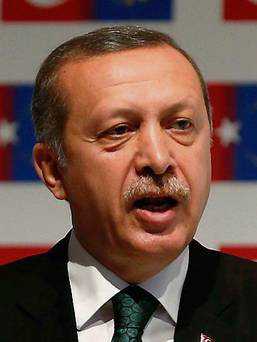 Turkish Prime Minister Tayyip Erdogan gestures during the Istanbul Conference of the Ministry For EU Affairs in Istanbul June 7, 2013. Turkey must investigate whether police used excessive force in a crackdown on days of anti-government demonstrations and hold those responsible to account, European Union enlargement commissioner Stefan Fuele said on Friday. REUTERS/Osman Orsal (TURKEY – Tags: CIVIL UNREST POLITICS)
Turkish Prime Minister Tayyip Erdogan gestures during the Istanbul Conference of the Ministry For EU Affairs in Istanbul June 7, 2013. Turkey must investigate whether police used excessive force in a crackdown on days of anti-government demonstrations and hold those responsible to account, European Union enlargement commissioner Stefan Fuele said on Friday. REUTERS/Osman Orsal (TURKEY – Tags: CIVIL UNREST POLITICS)
03 OCTOBER 2013
Turkey has been trying for years to join the European Union, presenting itself as a growing economic and political power and a bridge to Asian and Middle Eastern markets.
ALSO IN THIS SECTION
Hamzah mother gets 15 years in jail for horrific neglect
Seven in court on murder charges over fire deaths of Beaumont surgeon’s family
Hamzah’s mother threatened to kill other her children, son claims
Holiday Flats Amsterdam
1100+ Dream Holiday Apartments Book Your Short Stay from 35€/night
HouseTrip.com/Amsterdam-Apartments
Telekom APIs und Services
Mache Deine Anwendung noch besser: Mit den mächtigen APIs der Telekom!
DeveloperGarden.com/Telekom_APIs
Ads by Google
But the next country to join the EU’s existing 28 members is more likely to be one of six small Balkan countries, five of which still formed part of Yugoslavia when Turkey made its first membership bid.
Several powerful EU states are reluctant to open the door to a large, mainly Muslim country, even a member of the NATO Western military alliance, fearing a troublesome integration whereas small countries have a track record of smooth accession.
While the EU focuses its attention elsewhere, the Turkish government and public are increasingly despondent and have started to wonder whether it really needs Europe after all.
“I guess that nobody wants to say that we are not going to continue with the accession process, neither the EU nor Turkey,” said Turkey’s ambassador to the EU, Selim Yenel, speaking at a Brussels think-tank in September.
“But there will be one day in which we will have to decide on what to do about it, because this is going nowhere.”
Joining the EU can bring the benefits of easy access to the world’s largest trading bloc, free movement of workers, funding for poorer regions and infrastructure and the chance to belong to a relatively stable political union.
Over the next decade or so, Serbia, Macedonia, Montenegro and Albania, Bosnia and Kosovo may all be able to take advantage of those perks, following Slovenia and Croatia to a spot on the members’ list.
Meanwhile Turkey’s membership bid has been virtually frozen for three years, held back by political obstacles and resistance in some EU countries, including Germany, France and Austria.
Support for EU membership among the Turkish public fell to 44 percent this year from 73 percent in 2004, according to a recent German Marshall Fund report.
Ankara’s chief EU negotiator Egemen Bagis said last month his country would probably never join the EU because of the attitudes of the bloc’s existing members.
GEOGRAPHY
A senior official with direct knowledge of enlargement discussions said EU leaders were not focused on Turkey which would be the most populous member, giving it the largest share of seats in the European Parliament and influence across Europe’s institutions.
via Turkey questions its EU future as Brussels looks to Balkans – Independent.ie.






